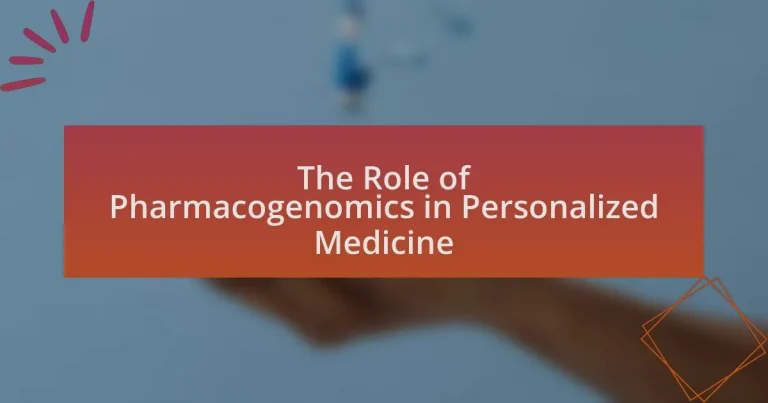Pharmacogenomics is a critical component of personalized medicine, focusing on tailoring drug therapies to an individual’s genetic profile. This article explores how pharmacogenomics enhances medication efficacy and safety by considering genetic variations that affect drug metabolism and response. Key topics include the influence of genetic factors on drug therapy, the importance of pharmacogenomics for patient outcomes, evidence supporting its effectiveness, and the challenges faced in clinical implementation. Additionally, the article discusses future trends and practical steps patients can take to leverage pharmacogenomic insights for improved health outcomes.
What is the Role of Pharmacogenomics in Personalized Medicine?
Pharmacogenomics plays a crucial role in personalized medicine by tailoring drug therapy based on an individual’s genetic makeup. This approach enhances the efficacy and safety of medications, as genetic variations can influence drug metabolism, efficacy, and the risk of adverse effects. For instance, studies have shown that individuals with specific genetic variants may require different dosages of drugs like warfarin or clopidogrel to achieve optimal therapeutic outcomes. By integrating pharmacogenomic data into clinical practice, healthcare providers can make informed decisions that improve patient care and reduce the trial-and-error approach often associated with prescribing medications.
How does pharmacogenomics influence drug therapy?
Pharmacogenomics influences drug therapy by tailoring medication choices and dosages based on an individual’s genetic makeup. This approach enhances the efficacy and safety of treatments, as genetic variations can affect drug metabolism, efficacy, and the risk of adverse effects. For instance, studies have shown that patients with specific genetic variants in the CYP2D6 gene may metabolize certain antidepressants differently, leading to variations in treatment response. By utilizing pharmacogenomic testing, healthcare providers can optimize drug therapy, reducing trial-and-error prescribing and improving patient outcomes.
What genetic factors are considered in pharmacogenomics?
Pharmacogenomics considers several genetic factors, including single nucleotide polymorphisms (SNPs), copy number variations (CNVs), and gene expression levels. SNPs are variations in a single nucleotide that can affect drug metabolism, efficacy, and toxicity. For instance, variations in the CYP450 gene family, which encodes enzymes responsible for drug metabolism, can lead to differences in how individuals process medications. CNVs involve changes in the number of copies of a particular gene, which can influence drug response. Additionally, gene expression levels can determine the amount of drug target proteins present in an individual, impacting therapeutic outcomes. These genetic factors are critical for tailoring drug therapies to individual patients, enhancing the effectiveness and safety of treatments.
How do these genetic factors affect drug metabolism?
Genetic factors significantly influence drug metabolism by affecting the expression and activity of enzymes responsible for drug processing. Variations in genes, particularly those encoding cytochrome P450 enzymes, can lead to differences in how individuals metabolize medications, resulting in variations in drug efficacy and toxicity. For instance, individuals with certain genetic polymorphisms may metabolize a drug too quickly, leading to subtherapeutic effects, or too slowly, resulting in adverse reactions. Studies have shown that approximately 30% of the population carries genetic variants that can alter drug metabolism, underscoring the importance of pharmacogenomics in tailoring medication regimens to individual genetic profiles.
Why is pharmacogenomics important for patient outcomes?
Pharmacogenomics is important for patient outcomes because it enables personalized medicine by tailoring drug therapies based on individual genetic profiles. This approach enhances the efficacy of treatments and minimizes adverse drug reactions, leading to improved health outcomes. For instance, studies have shown that patients with specific genetic variants metabolize drugs differently; for example, individuals with variations in the CYP2D6 gene may require different dosages of medications like antidepressants or opioids to achieve optimal therapeutic effects. By integrating pharmacogenomic data into clinical practice, healthcare providers can make more informed decisions, ultimately resulting in better patient care and increased treatment success rates.
What evidence supports the effectiveness of pharmacogenomics?
Pharmacogenomics has demonstrated effectiveness through various studies showing improved patient outcomes and reduced adverse drug reactions. For instance, a meta-analysis published in the Journal of the American Medical Association found that pharmacogenomic testing significantly improved medication efficacy and safety in patients with cardiovascular diseases, leading to a 30% reduction in adverse drug events. Additionally, the Clinical Pharmacogenetics Implementation Consortium guidelines recommend specific genetic tests for drugs like warfarin, where genetic variations can lead to serious complications if not considered, further supporting the clinical utility of pharmacogenomics in personalized medicine.
How does pharmacogenomics reduce adverse drug reactions?
Pharmacogenomics reduces adverse drug reactions by tailoring medication choices based on an individual’s genetic profile. This personalized approach allows healthcare providers to predict how a patient will respond to specific drugs, thereby minimizing the risk of harmful side effects. For instance, studies have shown that genetic variations in drug-metabolizing enzymes can significantly influence drug efficacy and toxicity. By analyzing these genetic markers, clinicians can select the most appropriate medication and dosage, leading to safer and more effective treatment outcomes.
What challenges exist in implementing pharmacogenomics in clinical practice?
Implementing pharmacogenomics in clinical practice faces several challenges, including limited clinician knowledge, insufficient integration into existing healthcare systems, and variability in genetic testing access. Clinicians often lack training in genetics, which hinders their ability to interpret pharmacogenomic data effectively. Additionally, healthcare systems may not have the infrastructure to incorporate pharmacogenomic information into electronic health records, making it difficult to utilize this data in prescribing decisions. Furthermore, disparities in access to genetic testing can lead to unequal benefits from pharmacogenomic advancements, particularly in underserved populations. These challenges collectively impede the widespread adoption of pharmacogenomics in personalized medicine.
What are the barriers to widespread adoption of pharmacogenomics?
The barriers to widespread adoption of pharmacogenomics include limited awareness among healthcare providers, insufficient integration into clinical practice, high costs of genetic testing, and regulatory challenges. Limited awareness results in healthcare providers not utilizing pharmacogenomic data to inform treatment decisions, which hinders personalized medicine. Insufficient integration into clinical workflows means that pharmacogenomic testing is not routinely performed, leading to missed opportunities for optimizing drug therapy. High costs associated with genetic testing can deter patients and providers from pursuing these tests, despite their potential benefits. Regulatory challenges, including the lack of standardized guidelines for pharmacogenomic testing and interpretation, further complicate its adoption in clinical settings.
How can healthcare providers overcome these challenges?
Healthcare providers can overcome challenges in implementing pharmacogenomics by integrating genetic testing into clinical workflows and enhancing education on its benefits. By adopting standardized protocols for genetic testing, providers can ensure consistent application and interpretation of results, which facilitates personalized treatment plans. Additionally, ongoing training programs for healthcare professionals about pharmacogenomics can improve their understanding and ability to communicate the significance of genetic information to patients. Research indicates that effective integration of pharmacogenomics into practice can lead to improved patient outcomes, as evidenced by a study published in the Journal of the American Medical Association, which found that patients receiving pharmacogenomic-guided therapy had a 30% reduction in adverse drug reactions.
How does pharmacogenomics integrate with other personalized medicine approaches?
Pharmacogenomics integrates with other personalized medicine approaches by tailoring drug therapies based on individual genetic profiles, which enhances treatment efficacy and minimizes adverse effects. This integration occurs alongside other personalized medicine strategies, such as genomics, proteomics, and metabolomics, which collectively provide a comprehensive understanding of a patient’s unique biological makeup. For instance, while pharmacogenomics focuses on how genes affect drug metabolism, genomics can identify genetic predispositions to diseases, enabling preventive measures. Studies have shown that utilizing pharmacogenomic data in conjunction with clinical data can improve patient outcomes; for example, the Clinical Pharmacogenetics Implementation Consortium (CPIC) guidelines recommend specific drug dosages based on genetic variants, demonstrating the practical application of this integration in clinical settings.
What are the future trends in pharmacogenomics and personalized medicine?
Future trends in pharmacogenomics and personalized medicine include the increasing integration of genomic data into clinical practice, advancements in gene editing technologies, and the development of more targeted therapies. The incorporation of large-scale genomic databases, such as the All of Us Research Program, aims to enhance understanding of genetic variations and their impact on drug response. Additionally, the rise of artificial intelligence and machine learning is expected to facilitate the analysis of complex genomic data, leading to more precise treatment plans tailored to individual patients. These trends are supported by ongoing research demonstrating that personalized approaches can improve treatment efficacy and reduce adverse drug reactions, as evidenced by studies showing that pharmacogenomic-guided therapy can lead to better outcomes in conditions like cancer and cardiovascular diseases.
How might advancements in technology impact pharmacogenomics?
Advancements in technology significantly enhance pharmacogenomics by enabling more precise genetic analysis and data integration. Technologies such as next-generation sequencing (NGS) allow for rapid and cost-effective sequencing of entire genomes, facilitating the identification of genetic variants that influence drug metabolism and efficacy. For instance, the use of NGS has been shown to improve the understanding of polymorphisms in genes like CYP450, which are crucial for drug response. Additionally, advancements in bioinformatics tools enable the integration of genomic data with clinical information, leading to more personalized treatment plans. This integration supports the development of tailored therapies that can minimize adverse drug reactions and optimize therapeutic outcomes, as evidenced by studies demonstrating improved patient responses when treatments are aligned with genetic profiles.
What role will pharmacogenomics play in the evolution of personalized medicine?
Pharmacogenomics will play a crucial role in the evolution of personalized medicine by enabling tailored drug therapies based on individual genetic profiles. This approach allows healthcare providers to predict how patients will respond to specific medications, thereby optimizing treatment efficacy and minimizing adverse effects. For instance, studies have shown that genetic variations can significantly influence drug metabolism; for example, individuals with certain variants of the CYP2D6 gene may metabolize antidepressants differently, necessitating dosage adjustments. By integrating pharmacogenomic data into clinical practice, personalized medicine can enhance patient outcomes and reduce trial-and-error prescribing, ultimately leading to more effective and safer healthcare solutions.
What practical steps can patients take to benefit from pharmacogenomics?
Patients can benefit from pharmacogenomics by discussing genetic testing options with their healthcare providers. Engaging in this conversation allows patients to understand how their genetic makeup may influence their response to medications, leading to more personalized treatment plans. Research indicates that pharmacogenomic testing can improve medication efficacy and reduce adverse drug reactions, as seen in studies where patients with specific genetic variants received tailored therapies that resulted in better health outcomes. By actively participating in their healthcare decisions and utilizing pharmacogenomic insights, patients can optimize their medication regimens for improved safety and effectiveness.





